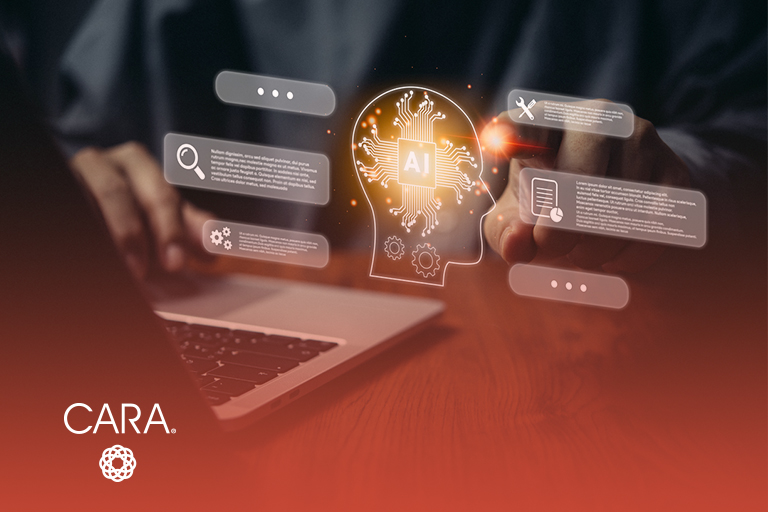
You know you should be leveraging AI, but how? Where? When? From our research and discussions with business leaders responsible for Talent, Learning, and Change Management, nearly everyone seems to be dipping their toes in the water when it comes to AI, but certainly at diverse levels of depth. As the SVP of Talent at The CARA Group and someone who is on my own intentional AI journey, I recently co-hosted a roundtable to discuss how leaders in our industry are leveraging AI to help their workforce and organizations change and grow. Our guests included senior business leaders from Fortune 500 companies, and our excellent panelists were Darci Johnson from Ipsen USA, Gina Flaig from Blue Cross Blue Shield Association, and Mick Clancy from Kraft-Heinz. Here are highlights from our discussion:
Leveraging AI – start at the top
Something we have been talking about internally, and a key question our business leaders discussed regarding leveraging AI, is what are the right use cases to get started?
One of the main ideas shared was to form a “Next Practice” leadership team, where your organization’s leaders can share their perspectives on specific AI use cases and shape policy regarding how employees should and should not be using it. Everyone agreed if leadership is not embracing AI, then they might resist employees’ use or even encourage employee resistance to using it. One panelist noted that his leadership team is driving the mindset that “this isn’t an overnight change, but a very long iterative evolution. We’re going to have to live through many advancements in AI technology.”
Communication and a culture of change
Of course, communication is fundamental to any change management effort. The group discussed that not only should C-Suite leaders emphasize and embrace change, but they also need to make sure other departments are encouraged to experiment. As one leader from a major food manufacturer noted, “this is likely already happening in pockets all over your company.” He noted that finance, HR, and marketing teams in his company are currently in deep discussions with their vendors to learn how to get value from their AI tools.
It was agreed that if you don’t already have a culture of innovation, where employees can experiment, stumble, and bounce back, then this aspect must be examined concurrently with the efforts to assist people in using AI and establishing AI governance.
Setting boundaries when leveraging AI
One of our panelists noted that even though they are still in the initial stages of it, his company is already seeing value from exploring privacy issues within their newly formed AI Ethics Committee. They shared that their committee includes representatives from data engineering, HR, legal, and their data privacy officer. Each member looks at how they are leveraging AI globally, especially as laws continue changing.
The way the committee has started working together is by sharing routines, policies, and processes. They discuss how and if leveraging AI makes sense within these workflows and whether the teams have the “green light” to do so. A simple example of this would be using Chat GPT to help create job descriptions. A more advanced example discussed concerns how companies are leveraging AI to create predictive maintenance and troubleshooting documentation for overnight manufacturing crews.
Bots in org charts?
One panelist fueled one of the most poignant topics during our roundtable discussion. “We all will need to get used to having a teammate who’s not human.” This, and the thought of how technology will be considered more than just a tool soon is an eye-opening idea that many of us are still getting used to. One of our roundtable guests shared that at her large insurance company, HR uses the term “humans in the loop working alongside AI, machine learning and automation.” Another guest shared that she has a colleague whose company is already putting bots on their org charts.
The future is already here
Our panelists all agreed that leveraging AI will become expected both at work and in our personal lives. We all will need to be patient and continue learning. A panelist quoted author William Gibson, “The future is already here, it’s just not evenly distributed.”
We discussed how AI can support employees who feel overburdened at work. We also explored how many feel threatened that AI could take over their job. Leaders cannot overlook these issues. Employing intentional, empathetic change management strategies will be key to helping overcome these real and human concerns.
If you would like to join us at one of our upcoming invitation-only roundtables for business leaders in HR, Organizational Change, Learning and Talent Solutions, click here.
If you need Learning, Change Management and Communications expertise along your organization’s AI journey, we have the people, processes, and experience to support you. We can facilitate leadership conversations, create governance teams and structures, upskill, and, of course, help you manage the change. Let’s connect.
Connect with us


